|
|
|
Sort Order |
|
|
|
Items / Page
|
|
|
|
|
|
|
| Srl | Item |
| 1 |
ID:
061770
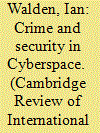

|
|
|
|
|
| Publication |
Apr 2005.
|
| Summary/Abstract |
As we have become dependent on the internet, as the ‘network of networks’, so we have become vulnerable to criminal and terrorist networks that use cyberspace as a means to undermine and circumvent state control. Protecting against those that wish to attack the integrity, confidentiality and availability of systems, and the data they process, is primarily an issue of implementing appropriate security measures. But how do governments react to such threats against social and economic stability? This article examines recent inter-governmental harmonisation initiatives addressing the suitability of the criminal code, the adequacy of law enforcement powers to investigate cyberspace activities and the need for greater transnational co-operation. Such reforms challenge some traditional conceptions of state control and authority and can be seen as threatening existing rights and interests.
|
|
|
|
|
|
|
|
|
|
|
|
|
|
|
|
| 2 |
ID:
061773


|
|
|
|
|
| Publication |
Apr 2005.
|
| Summary/Abstract |
This article aims to articulate how humanitarian action and counter-terrorism could be influencing the current shape of international relations through an examination of recent discourses on terrorism and internal displacement. These discourses have produced two corresponding approaches to state sovereignty that share the need to view sovereignty as measured in terms of the degree to which a state discharges its ‘sovereign responsibilities’ and yet that propose conflicting prescriptions for action against states deemed to fail in exercising such requirements. As internal sovereignty increasingly becomes challengeable by external sovereignty, this article concludes by suggesting how the two approaches can be synthesised in a fruitful manner.
1 The views expressed in this article are strictly personal. The author would like to thank three anonymous referees at the Cambridge Review of International Affairs for their comments on the draft.
|
|
|
|
|
|
|
|
|
|
|
|
|
|
|
|
| 3 |
ID:
061769
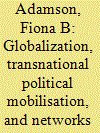

|
|
|
|
|
| Publication |
Apr 2005.
|
| Summary/Abstract |
This article examines how globalisation processes provide new incentives and opportunities for non-state political entrepreneurs to build transnational political movements. Drawing on the literatures on non-violent social movements and transnational networks, the article examines terrorism and political violence as components of the ‘repertoires of contention’ used by radical transnational groups seeking political change. Examples from both the pre- and post-9/11 periods are provided, and the implications for traditional models of state security are discussed. The article concludes by contending that the combination of increased levels of globalisation and the emergence of new networks of violence is creating a fundamental shift in the international security environment, in which the distinction between internal and external security threats is increasingly blurred. While state security strategies are reflecting these changes, less attention has been paid to the political implications of these changes. New security responses need to also be matched by new sets of political strategies at the global level.
1 Versions of this article were presented at the Workshop ‘Globalisation and Security’, Olin Institute for Strategic Studies, Harvard University, Cambridge, MA, 14–16 November 2003 and at the 45th Annual Convention of the International Studies Association, Montreal, 17-20 March 2004. The author wishes to thank Nora Bensahel, Jonathan Kirshner, Sean Lynn-Jones, participants at the Olin workshop and two anonymous reviewers for their helpful comments.
|
|
|
|
|
|
|
|
|
|
|
|
|
|
|
|
| 4 |
ID:
061775


|
|
|
|
|
| Publication |
Apr 2005.
|
| Summary/Abstract |
The article argues that global security should be seen as synonymous with human security, and that strategic studies should be located within that broader rubric. Mounting such an argument means meeting the charge of those who see the broader construction of strategic studies as vague and meaningless, and as detracting from the ability to make good policy. The article attempts, therefore, to map human security in as inclusive and systematic a way as possible. It attempts to show that the concept is neither vague nor meaningless, and is suitable, therefore, to be the basis for a comprehensive account of global security.
|
|
|
|
|
|
|
|
|
|
|
|
|
|
|
|
| 5 |
ID:
061772


|
|
|
|
|
| Publication |
Apr 2005.
|
| Summary/Abstract |
This article addresses the post-Cold War security and defence discourse in Norway, focusing on the impact of the transformation of NATO, an increasingly ambitious EU within security matters and the transatlantic tensions in the War on Terror. The article argues that changes or continuity in policy result from the discursive battle between various power constellations, which are forcing conflicting understandings of reality on each other. In this battle, the dominant representation frames NATO's transformation as a precondition for national defence with reference to alliance solidarity, loyalty and interoperability. The alternative representation, on the other hand, has framed NATO's transformation as negative for national defence, claiming that forces trained for global, warlike missions are neither capable nor available for national defence tasks such as containment of Russia's strategic interests in the Barents Sea. The EU has been brought into the security and defence discourse only when new integration steps, such as the European security and defence policy and EU Battle Groups, put the question of how far Norway may participate, to a test. However, developments like the slow withering away of NATO and unilateralist US foreign policy on Iraq are contributing to pushing the Norwegian discourse, and hence policy, closer to Europe.
1 This article draws on research I have done with financial support from the Norwegian Ministry of Defence.
|
|
|
|
|
|
|
|
|
|
|
|
|
|
|
|
| 6 |
ID:
061774
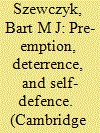

|
|
|
|
|
| Publication |
Apr 2005.
|
| Summary/Abstract |
The policy of the United States, outlined in the 2002 National Security Strategy, whereby the US claims a right under international law to engage in pre-emptive use of force to prevent a rogue state's development of nuclear weapons, or any weapons of mass destruction (WMD), is unnecessary and therefore unlawful under customary international law of self-defence. This conclusion is reached through a comprehensive and intensive assessment of the normative reactions of politically effective actors to China's development of nuclear weapons during a two-year period between the Cuban Missile Crisis and China's first test in October 1964. While pre-emptive use of force against China, a rogue state, was considered by both the United States and most likely by the Soviet Union, neither used force to prevent it developing nuclear weapons. Since a policy of pre-emptive use of force was unnecessary for either state's self-defence, it would have been unlawful under customary international law. Given that the current strategic scenario of states vis-à-vis rogue states is the same under most circumstances, notwithstanding the existence of international terrorist networks, the article concludes that the proposed claim of the United States is, prima facie, unnecessary to its self-defence, and therefore unlawful under customary international law of self-defence. It shifts the burden of proof to policymakers claiming that all rogue states can be lawfully prevented through pre-emptive use of force from acquiring nuclear weapons, to establish that a particular state cannot be deterred from the use of nuclear weapons. Though the preventive war claim of the US National Security Strategy 2002 may turn out to be an effective strategic bluff in limiting WMD proliferation, the wisdom of the threat should not be confused with the illogic of preventive war.
1 The author wishes to thank Professor Michael Reisman for his advice and guidance on the legal methodology used in the article and Professor John Lewis Gaddis for his emphasis on the strategic considerations underlying the Cold War policies of the United States, the Soviet Union, and Communist China in relation to each other. Any errors or omissions are solely the fault of the author.
|
|
|
|
|
|
|
|
|
|
|
|
|
|
|
|
| 7 |
ID:
061768
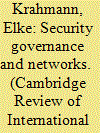

|
|
|
|
|
| Publication |
2005.
|
| Summary/Abstract |
The end of the Cold War has not only witnessed the rise of new transnational threats such as terrorism, crime, proliferation and civil war; it has also seen the growing role of non-state actors in the provision of security in Europe and North America. Two concepts in particular have been used to describe these transformations: security governance and networks. However, the differences and potential theoretical utility of these two concepts for the study of contemporary security have so far been under-examined. This article seeks to address this gap. It proposes that security governance can help to explain the transformation of Cold War security structures, whereas network analysis is particularly useful for understanding the relations and interactions between public and private actors in the making and implementation of national and international security policies.
|
|
|
|
|
|
|
|
|
|
|
|
|
|
|
|
| 8 |
ID:
061767


|
|
|
| 9 |
ID:
179086


|
|
|
| 10 |
ID:
061771
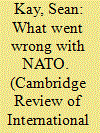

|
|
|
|
|
| Publication |
Apr 2005.
|
| Summary/Abstract |
This article provides a perspective on strategic trends in the NATO alliance and the broader transatlantic relationship. It evaluates the extent of NATO's successes and failures over the last 15 years in the areas of the Balkans, NATO enlargement, and the international campaign against terrorism. The central conclusion is that, while NATO's members have significant technical reforms available that could help to reinvigorate the institution, none is likely to come to fruition without a major change in strategic concepts on both sides of the Atlantic.
|
|
|
|
|
|
|
|
|
|
|
|
|
|
|
|
|
|
|
|
|